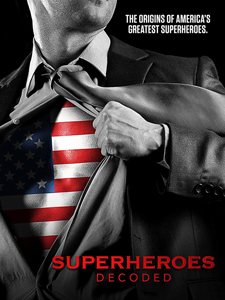“Superheroes Decoded,” a two-episode History Channel documentary from 2017, isn’t what I thought it would be. But it turns out to something good: The definitive analysis of the history of superheroes and how they bob and weave with American history over the past century.
Adults will learn a little something – even if a lot of it is a fun refresher — and brainy younger viewers should be enthralled too. Its only major problem is that if you’ve just watched PBS’ “Superheroes: A Never-Ending Battle” (2013), the first episode will be redundant – although it does go deeper.
From legends to rebels
The first episode, “American Legends,” examines superheroes as propagandists – the Jewish-writer-helmed Captain America punching Hitler in the early days of World War II, encouraging the idea of the USA entering the war.
The second episode, “American Rebels,” is where writer Josh Mensch’s documentary shines, as it breaks free from “Never-Ending Battle’s” ground and examines superheroes who run counter to the mainstream.
I was misled by the title. I thought the documentary – narrated by “Batman: The Animated Series” voice-acting legend Kevin Conroy — would be about “coding,” the notion that works of art contain “coded” but purposeful meanings that are not acceptable to the mainstream of the time.
It does cover some of that, notably when it gets to Fredric Wertham’s 1954 book “Seduction of the Innocent,” which ripped “Wonder Woman” and “Batman” for being homosexual texts and inspired the creation of the Comics Code Authority, which killed the medium’s creative flexibility for decades.
There’s no denying those subtexts are apparent if someone looks for them – Themyscira contains only women, and Batman and Robin sometimes share the same bed – but as one of the interviewed comic historians points out, kids don’t notice that stuff. So really, it’s a case of stories working on multiple levels.
Later, “Decoded” touches on the well-trod idea that the X-Men’s mutant nature stands for anyone who feels different. It shows the scene in “X2” where Iceman “comes out” to his mom, a parallel for young gays. (The line “Have you tried not being a mutant?” has always bugged me, because it seems like a ripoff of “Buffy’s” “Have you tried not being a Slayer?,” but no one mentions that.)
Reflecting the zeitgeist
Mostly, though, “Decoded” is about how comic writers and their characters reflected the American sociopolitical zeitgeist in the early days, then became more proactive in modern days, pivoting at the Vietnam War and President Nixon’s corruption.
The documentary uses more footage of American history than “Never-Ending Battle” does, but it also uses animated comics panels and clips from superhero films and TV, striking a perfect balance so we learn something while having fun.
Among the talking heads, some are more insightful than others, but all are entertaining. The all-star is “Game of Thrones” creator George R.R. Martin, who is a blast to listen to as he hits on topics both broad and personal – like the fascinating trivia that he was the first registered guest at the inaugural Comicon and that Stan Lee’s reply to his glowing letter about “The Fantastic Four” sparked his own career.

Diverse ranks
The first episode reveals a tidbit I was unaware of: The independent “All-Negro Comics” lasted one successful issue in 1947, but then was unable to procure newsprint. So when Luke Cage was declared “the first black superhero” in the 1970s, that wasn’t totally accurate.
The bulk of the juicy stuff is in episode two, where we learn about 1970s black superheroes – Cage, Black Panther, Storm, Falcon — asserting their equality and Wonder Woman returning to her roots. The midcentury “New Wonder Woman” is now considered an embarrassing time in the medium’s history, as a domestic Diana is obsessed with finding a husband.
But I think – even if it’s inadvertent – it makes for one of those classic arcs about losing your powers then rediscovering them (often the subject of film No. 2 in heroes’ journeys). In 1972, urged on by Ms. Magazine, Wonder Woman becomes a full-powered superhero again.
I soaked up the most new knowledge in the segment on the current version Ms. Marvel, who is Muslim. She continues the tradition of diversity and equality started in the 1970s with those black heroes, the re-powered Wonder Woman and the newly international X-Men.
Free-thinking heroes
But “American Rebels” points out that this era of inclusion is paralleled by the old standbys’ confusion about a world (new to them) in which the government can’t be trusted.
We learn about Captain America temporarily becoming Nomad, disillusioned by Nixon. And we see how Wolverine, Punisher and the “Dark Knight Returns” version of Batman usher in the age of anti-heroes – whose aims are the same as pure superheroes but whose methods are morally questionable.
“Decoded” is structurally familiar, with interviewed experts, narration and clips, but the whole production is the height of crisp professionalism.
If you’ve recently watched “Never-Ending Battle,” episode two of “Decoded” will be enough for you. But if you watch only one superhero documentary, “Superheroes Decoded” should be it.


